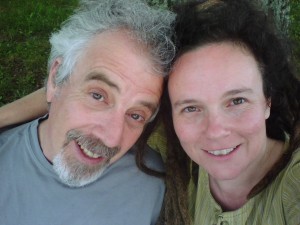Community Plus Partner: Integrating Significant Others
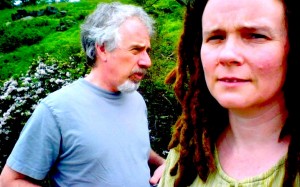 Relationships, polyamorous or monogamous, are complicated enough. Imagine if all your friends had to reach consensus on whether you and your sweetie(s) could move in together. Well, actually, your friends might relish that power. Anyway, welcome to the alien terrain in which my partner and I find ourselves. I live at Heathcote Community and in order for my partner to share my home, he has to apply and be accepted as a member of the Community, a process that can take eight months or more to be finalized.
Relationships, polyamorous or monogamous, are complicated enough. Imagine if all your friends had to reach consensus on whether you and your sweetie(s) could move in together. Well, actually, your friends might relish that power. Anyway, welcome to the alien terrain in which my partner and I find ourselves. I live at Heathcote Community and in order for my partner to share my home, he has to apply and be accepted as a member of the Community, a process that can take eight months or more to be finalized.
Even though Heathcote is a mixture of couples and singles, this is not an issue we’ve often faced, considering a membership application from an existing member’s lover. It’s a very different dynamic than welcoming a couple together or an individual. What happens if someone doesn’t like this new partner?
In our tried and true process, we invite an applicant to visit for 21 days, either consecutively or over time. We get acquainted and discuss the Community’s values, systems, etc. Either the applicant or a Heathcoter can decide at any time that things don’t seem to be a match. But if all seems cozy, we approve the applicant to move in and begin a seven month provisional membership period.
But what if there is an issue, and it’s a community member’s lover? The stakes get much higher. If the Community rejects this applicant, they stand a good chance of losing an existing member, too. Will people feel pressured, in that case, to ignore problems?
 My partner, C.T., has unique worries. He’s a consensus trainer and writer. Will Community members feel self conscious practicing consensus around him, or will they be resistant to his thoughts on our process, assuming that he expects us to do things his way? How to tread lightly and lovingly when you’re something of a big wig in your field…
My partner, C.T., has unique worries. He’s a consensus trainer and writer. Will Community members feel self conscious practicing consensus around him, or will they be resistant to his thoughts on our process, assuming that he expects us to do things his way? How to tread lightly and lovingly when you’re something of a big wig in your field…
Mostly things are smooth sailing so far. But I know everyone’s aware of the new dynamic. We did dance here briefly before when a former partner of mine applied. That was quite a minefield, as that partner truly wasn’t a fit for Heathcote, despite being likable on many levels.
Now C.T. and I aren’t the only ones. Nick’s partner Rachel has applied for membership. Previously, I experienced that moving to a small, rural Community as a single person was a decision to remain single. It seemed very hard to make, maintain and grow connections.
Did something shift? Has the internet negated that isolation? I have had good luck with GreenSingles… Whatever the case, along with the singles and couples interested in Heathcote, we also have partners coming to roost!
—WT
Please join our Hippie Chick Diaries fan page on Facebook!
Subscribe to this blog's RSS feed
STILL A Revolutionary Decision-Making Process
From Wren: I’m reproducing this article from several years ago, with C.T.’s permission. C.T. Butler and I, along with a forming collective of facilitators, have been putting new language to the many paradigm shifts that help practitioners of consensus decision-making succeed in conducting meetings that reflect the egalitarian, non-violent, post-privilege world in which we want to live. This article, nearly twenty years old, shows that, although we’re bringing clarity and new language to the subtle concepts that help consensus succeed, they’re not all new ideas. —WT
If you were asked to pick one thing that might bring about major social, political, and economic change in this country, what would you pick? Most people would pick their favorite issue; be it civil rights, demilitarization, environmental sustainability, or whatever. Some people would choose a system of values to replace the capitalism system such as socialism or the Ten Key Values of the Greens. But few people would even think of changing group dynamics (the way people treat each other when interacting with one another in a group); or specifically, the process they use when making decisions.
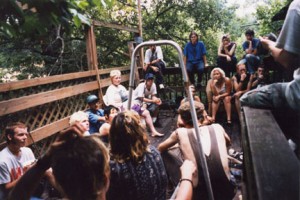 Process is the key to revolutionary change. This is not a new message. Visionaries have long pointed to this but it is a hard lesson to learn. As recently as the 70s, feminists clearly defined the lack of an alternative process for decisionmaking and group interaction as the single most important obstacle in the way of real change, both within progressive organizations and for society at large. Despite progress on many issues of concern to progressive-minded people, very little has changed in the way people treat each other, either locally or globally, and almost nothing has changed about who makes the decisions. The values of competition, which allow us to accept the idea that somebody has to lose; the structure of hierarchy, which, by definition, creates power elites; and the techniques of domination and control, which dehumanizes and alienates all parties affected by their use, are the standards of group interaction with which we were all conditioned. There are but a few models in our society which offer an alternative.
Process is the key to revolutionary change. This is not a new message. Visionaries have long pointed to this but it is a hard lesson to learn. As recently as the 70s, feminists clearly defined the lack of an alternative process for decisionmaking and group interaction as the single most important obstacle in the way of real change, both within progressive organizations and for society at large. Despite progress on many issues of concern to progressive-minded people, very little has changed in the way people treat each other, either locally or globally, and almost nothing has changed about who makes the decisions. The values of competition, which allow us to accept the idea that somebody has to lose; the structure of hierarchy, which, by definition, creates power elites; and the techniques of domination and control, which dehumanizes and alienates all parties affected by their use, are the standards of group interaction with which we were all conditioned. There are but a few models in our society which offer an alternative.
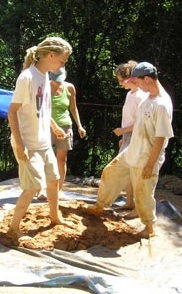 All groups, no matter what their mission or political philosophy, use some form of process to accomplish their work. Almost all groups, no matter where they fall on the social, political, and economic spectrum of society, have a hierarchical structure, accept competition as “natural”, acceptable, and even desirable, and put a good deal of effort into maintaining control of their members. It is telling that in our society, there are opposing groups, with very different perspectives and values, which have identical structures and techniques for interaction and decisionmaking. If you played a theater game in which both groups wore the same costumes and masks and spoke in gibberish rather than words, a spectator would not be able to tell them apart.
All groups, no matter what their mission or political philosophy, use some form of process to accomplish their work. Almost all groups, no matter where they fall on the social, political, and economic spectrum of society, have a hierarchical structure, accept competition as “natural”, acceptable, and even desirable, and put a good deal of effort into maintaining control of their members. It is telling that in our society, there are opposing groups, with very different perspectives and values, which have identical structures and techniques for interaction and decisionmaking. If you played a theater game in which both groups wore the same costumes and masks and spoke in gibberish rather than words, a spectator would not be able to tell them apart.
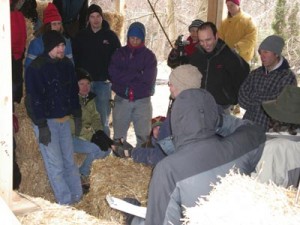 So what would an alternative revolutionary decisionmaking process look like, you ask? To begin with, a fundamental shift from competition to cooperation. This does not mean to do away with competition. Ask any team coach what the key to victory is and you will be told “cooperation within the team”. The fundamental shift is the use of competition not to win, which is just a polite way of saying to dominate, to beat, to destroy, to kill the opposition; but rather, to use competition to do or be the best. In addition, the cooperative spirit recognizes that it is not necessary to attack another’s efforts in order to do your best; in fact, the opposite is true. In most situations, helping others do their best actually increases your ability to do better. And in group interactions, the cooperative spirit actually allows the group’s best to be better than the sum of its parts.
So what would an alternative revolutionary decisionmaking process look like, you ask? To begin with, a fundamental shift from competition to cooperation. This does not mean to do away with competition. Ask any team coach what the key to victory is and you will be told “cooperation within the team”. The fundamental shift is the use of competition not to win, which is just a polite way of saying to dominate, to beat, to destroy, to kill the opposition; but rather, to use competition to do or be the best. In addition, the cooperative spirit recognizes that it is not necessary to attack another’s efforts in order to do your best; in fact, the opposite is true. In most situations, helping others do their best actually increases your ability to do better. And in group interactions, the cooperative spirit actually allows the group’s best to be better than the sum of its parts.
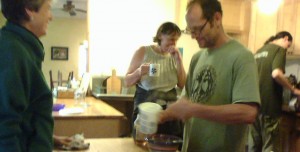 Cooperation is more than “live and let live”. It is making an effort to understand another’s point of view. It is incorporating another’s perspective with your own so that a new perspective emerges. It is suspending disbelief, even if only temporarily, so you can see the gem of truth in ideas other than your own. It is a process of creativity, synthesis, and open-mindedness which leads to trust-building, better communication and understanding, and ultimately, a stronger, healthier, more successful group.
Cooperation is more than “live and let live”. It is making an effort to understand another’s point of view. It is incorporating another’s perspective with your own so that a new perspective emerges. It is suspending disbelief, even if only temporarily, so you can see the gem of truth in ideas other than your own. It is a process of creativity, synthesis, and open-mindedness which leads to trust-building, better communication and understanding, and ultimately, a stronger, healthier, more successful group.
The next step is the development of an organization which is non-hierarchical or egalitarian. A corresponding structure would include: participatory democracy, routine universal skill-building and information sharing, rotation of leadership roles, frequent evaluations, and, perhaps most importantly, equal access to power. Hierarchical structures are not, in and of themselves, the problem. But their use concentrates power at the top and, invariably, the top becomes less and less accessible to the people at the bottom, who are usually most affected by the decisions made by those at the top. Within groups (and within society itself), there becomes a power elite. In an egalitarian structure, everyone has access to power and every position of power is accountable to everyone. This does not mean that there are no leaders. But the leaders actively share skills and information. They recognize that leadership is a role empowered by the entire group, not a personal characteristic. A group in which most or all of the members can fill any of the leadership roles cannot easily be dominated, internally or externally.
The last and most visible step towards revolutionary change in group process is the manner in which members of the group interact with each other. Dominating attitudes and controlling behavior would not be tolerated. People would show respect and expect to be shown respect. Everyone would be doing their personal best to help the group reach decisions which are in the best interest of the group. There would be no posturing and taking sides. Conflicts would be seen as an opportunity for growth, expanding people’s thinking, sharing new information, and developing new solutions which include everyone’s perspectives. The group would create an environment where everyone was encouraged to participate, conflict was freely expressed, and resolutions were in the best interest of everyone involved. Indubitably, this would be revolutionary.
You can contact C.T. Butler at:
Food Not Bombs Publishing
7304 Carroll Ave #136
Takoma Park, MD 20912
website: www.consensus.net
Telephone: 1-800-569-4054
Order copies of his books, On Conflict & Consensus and Consensus for Cities on the above site. His book, Food Not Bombs: How to Feed the Hungry and Build Community, is available on Amazon.com.
Please join our Hippie Chick Diaries fan page on Facebook!
Help Spread Consensus Decision-Making Through Indymedia and the World Social Forum in Dakar, Senegal
***PRESS RELEASE***PLEASE CIRCULATE***
The opportunity of a lifetime is before me. I’m writing for support of a project to train members of media cooperatives and collectives around the world in consensus decision-making and community building.
Consensus author/trainer C.T. Lawrence Butler and I have been working with organizers to structure an event leading up to 2011’s World Social Forum in Dakar, Senegal. The event is called the Indy Media Convergence, a two-week period when members of Independent Media Center, aka Indymedia or IMC, gather to create consensus-based community and learn new skills in communication, media and journalism. Afterwards, the members remain in Dakar to cover the World Social Forum, from perspectives free of corporate interests.
 Activist C.T. Lawrence Butler is co-founder of Food Not Bombs, the international network of local organizations feeding homeless and redistributing edible food that would otherwise go to waste. Local Food Not Bombs groups operate by consensus, and C.T. has led workshops in the US, Europe and Africa, showing thousands that horizontal structure is possible. He’s the author of the definitive On Conflict and Consensus, as well as Consensus for Cities and Food Not Bombs. He has been arrested over fifty times protesting war, nuclear power and exercising his right to give away food.
Activist C.T. Lawrence Butler is co-founder of Food Not Bombs, the international network of local organizations feeding homeless and redistributing edible food that would otherwise go to waste. Local Food Not Bombs groups operate by consensus, and C.T. has led workshops in the US, Europe and Africa, showing thousands that horizontal structure is possible. He’s the author of the definitive On Conflict and Consensus, as well as Consensus for Cities and Food Not Bombs. He has been arrested over fifty times protesting war, nuclear power and exercising his right to give away food.
 I, Wren Tuatha, am a writer/filmmaker/facilitator who has lived and practiced consensus decision-making at Heathcote Community for fifteen years. I’m Artist-in-Residence there, and am currently writing a book, Consensus for Kids, based on twenty-five years in alternative education and seven years designing and facilitating Heathcote’s Open Classroom. I am a facilitator/consultant to Intentional Communities, helping established and forming communities prioritize what I call “social technologies”—consensus, conflict resolution, ZEGG Forum, etc. My website, HippieChickDiaries.com, is a first person account of life in Intentional Community, or, as I like to put it, “Wren Tuatha’s complicated adventures in simple living….”
I, Wren Tuatha, am a writer/filmmaker/facilitator who has lived and practiced consensus decision-making at Heathcote Community for fifteen years. I’m Artist-in-Residence there, and am currently writing a book, Consensus for Kids, based on twenty-five years in alternative education and seven years designing and facilitating Heathcote’s Open Classroom. I am a facilitator/consultant to Intentional Communities, helping established and forming communities prioritize what I call “social technologies”—consensus, conflict resolution, ZEGG Forum, etc. My website, HippieChickDiaries.com, is a first person account of life in Intentional Community, or, as I like to put it, “Wren Tuatha’s complicated adventures in simple living….”
 IMC is a network of collectives, established in 1999 around the anti-WTO protests in Seattle. Going to Dakar, IMC will be covering the World Social Forum, a series of events in answer to the capitalist World Economic Forum. IMC organizers are committed to members learning interpersonal communication and inclusive decision-making, as well as practical media skills, such as building radios and transmitters.
IMC is a network of collectives, established in 1999 around the anti-WTO protests in Seattle. Going to Dakar, IMC will be covering the World Social Forum, a series of events in answer to the capitalist World Economic Forum. IMC organizers are committed to members learning interpersonal communication and inclusive decision-making, as well as practical media skills, such as building radios and transmitters.
To organizers, the point is really the process. “If we don’t have consensus training, then it’s just a technical workshop,” says Sphinx, a documentary filmmaker and IMC organizer from Cameroon, now living in exile in the US. Indymedia’s mission incorporates consensus principles but many of the over 200 chapters need training.
During the 2011 Convergence, over 100 Africans, as well as members from South America, the US and Europe will experience consensus, as well as Open Space Technology, and possibly ZEGG Forum, an often emotional group process in which communities and their members view and get past some blocks that may interfere with their common work. We will also facilitate cultural sensitivity work to help the diverse community come together through understanding.
Now that our organizing structure has been adopted by the group, we need funding to make the trip. We need to raise $11000 for our consensus work in Dakar.
DESCRIPTION AMOUNT
WSF reg & on ground expenses, CT & WT 1000
airfare for CT & WT 5000
CT home expenses 1500
WT home expenses 1500
100 copies of On Conflict and Consensus 1500
emergencies & miscellaneous 500
11000
I became acquainted with GEO’s Michael Johnson through several ZEGG Forum facilitator trainings at Ganas Community. And I’m excited that he and I are beginning to collaborate in helping worker-owned cooperatives continually develop their social technology skills, so that existing horizontal structures don’t have to revert to hierarchy, and so that all members can share power and be heard in decision-making. This breeds a profound sense of community, and streamlined energy to act on and realize our dreams.
IMC organizers like Sphinx want to use the consensus community at the Convergence to inspire participants to go home and create a handful of sustained, working models of consensus in Africa.
Through my site and networking, I’ve advanced my goals of putting Intentional Community on everyone’s list of “top ten ways to go green,” and helping communities, landed, work or affinity based, to realize that social technologies—the ability to make decisions that include every member’s buy-in, skills at arriving beyond conflict by listening and understanding the other, not just delivering one’s own point—are as important to a community’s success as having the greenest building idea or innovative Permaculture garden design.
An upcoming book C.T. and I are working on develops this idea. Often people tell us that they tried consensus or saw it in action somewhere and they decided that it was too slow or didn’t really work. We agree that consensus done poorly looks just like that, and it isn’t satisfying or effective. We observe that people try to apply the basic concepts of consensus but have problems if they are neglectful or unaware of what we are coming to call the body and the soul of consensus.
When I was in film school, instructors would admonish us to learn the rules first, then feel free to break them. In the same way, consensus has a specific structure, or “body,” that should be learned, not because rules are rules, but because getting them deeply will inform your choices when you go to improvise. We see well-meaning activists who are quick to shed the saddle but then don’t know how to ride the horse.
Also, horizontal structures such as consensus are true paradigm shifts, not just changing Robert’s Rules of Order for Butler’s. Over time practitioners shed old habits, assumptions and attachments and form new curiosities, learning to trust the group. But in the meantime, consensus decision-making with members who are still trying to debate or practice old styles of leadership can be hard. We think of the paradigm shift individuals and groups go through as the “soul” of consensus.
So, as you might imagine, it is hugely important to the Dakar Indy Media Convergence that the architects of the “body” be there to help community members discover the “soul” of their community’s process.
What can you or your organization contribute? We are asking for donations totaling $11,000 to fund our travel and facilitation efforts, as well as providing students with books. We plan to blog daily from the Convergence and the WSF, as connectivity allows.
If you should wish your contribution to be tax deductible, we can work through Indymedia’s finance committee, a non-profit.
Please contact Wren Tuatha, curiocoast@comcast.net, 410-458-2310 or C.T. Butler, ctbutler@together.net, 301-586-2560 for details.
Thank you so much for partnering with us in this work that can help all groups deepen the difference they’re trying to make in the world.
Wren, Heathcote Community, November 11, 2010
C.T. Butler: Incredible Life; Indelible Stories
 C.T. Butler makes me look good. It’s my turn to cook the Heathcote Community dinner again and the consensus trainer/vegetarian chef and co-founder of Food Not Bombs is my guest and helper! Or more accurately on this day, I’m his helper.
C.T. Butler makes me look good. It’s my turn to cook the Heathcote Community dinner again and the consensus trainer/vegetarian chef and co-founder of Food Not Bombs is my guest and helper! Or more accurately on this day, I’m his helper.
Nearly all of the adult members of Heathcote take turns cooking dinners, which we share six nights a week. It comes out to cooking about twice a month. The rest of the nights, we just show up and get fed. Since we rotate, folks tend to make their specialties. So not only does someone else cook my dinner, but I get their best.
I don’t profess to have a best.
I observe with bewilderment people who savor cooking as a hobby, a joy, a vocation or avocation. I didn’t get that gene or whatever. Me, I like to eat well so I cook. I get no special creative satisfaction out of the process. Even so, since I like to eat well, I do know how to get a sparkle from my spicings.
 Cooking with C.T. is like taking a car ride with a war correspondent. We have consensed upon his traditional refried beans, a recipe that originated in El Salvador & Nicaragua. As he casually chops onions and garlic, he tries to remember the recipe from his days of feeding homeless people and protesters with Food Not Bombs. As he slices proportions down to feed the twenty or so we’re expecting, he’s reminded of arrests and police beatings and stories start to flow.
Cooking with C.T. is like taking a car ride with a war correspondent. We have consensed upon his traditional refried beans, a recipe that originated in El Salvador & Nicaragua. As he casually chops onions and garlic, he tries to remember the recipe from his days of feeding homeless people and protesters with Food Not Bombs. As he slices proportions down to feed the twenty or so we’re expecting, he’s reminded of arrests and police beatings and stories start to flow.
 Food Not Bombs just observed the thirtieth anniversary of the occupation of Seabrook Nuclear Power Plant (May 24, 1980). The six activists who would eventually rent a house together and establish the first Food Not Bombs collective, were all protesters at that event. When one of them, Brian Feigenbaum, was arrested, the others literally started holding bake sales for his defense! I’m reminded of the t-shirt/bumper sticker slogan, It will be a great day when the schools have all the money they need and the Air Force has to have a bake sale to buy a bomber.
Food Not Bombs just observed the thirtieth anniversary of the occupation of Seabrook Nuclear Power Plant (May 24, 1980). The six activists who would eventually rent a house together and establish the first Food Not Bombs collective, were all protesters at that event. When one of them, Brian Feigenbaum, was arrested, the others literally started holding bake sales for his defense! I’m reminded of the t-shirt/bumper sticker slogan, It will be a great day when the schools have all the money they need and the Air Force has to have a bake sale to buy a bomber.
Thus started a food/activism connection for the collective. “Most of us worked in restaurants at the time, cooks, waiters, etc., and we knew first hand the mountains of food that’s wasted,” C.T. explains. At first, the group collected the restaurant and grocery store leftovers hoping to feed themselves for free, liberating time and resources for their activism. But immediately they could see that they had discovered a resource far beyond their own needs. “Of course, we were activists, so our values were to see the food get used where it was needed,”
This took several forms. The collective gave food away in Harvard Square, which established the non-violent direct action template that eventually prompted clashes with police in cities around the world and arrests for serving food without a permit (although their home town of Cambridge, Massachusetts was supportive, negotiating with FNB and eventually naming C.T. Peace Commissioner). Food Not Bombs also catered demonstrations and direct actions, feeding participants so they could stay on site long hours, keeping the protests going.
Thirty years later, C.T. stands in the Heathcote Mill kitchen, mashing the pinto and black turtle beans in small batches, because we couldn’t find a masher with a long enough handle to reach the bottom of the pressure cooker. “I always say I’m mashing in the love, it looks violent but it’s made with love,” he smiles without stopping.
So many times, that sentiment has been spoken in this kitchen. I’ve heard many Heathcote members describe the act of feeding their community as one of nurturing and love. How broken and sad it seems to me that the FBI would eventually target Food Not Bombs as a “terrorist” organization. And that feeding the hungry would be viewed as a crime in dozens of cities over the globe, resulting in thousands of arrests of Food Not Bombs chapter volunteers the world over.
But right now, C.T. is feeding me and mine. As from that first Food Not Bombs collective house in Cambridge, Massachusetts, autonomous chapters operate by consensus. C.T. has written two books on consensus decision-making. And he’s had a long friendship with Heathcote through his consensus workshops. This community’s consensus on this meal is: forty thumbs up!
